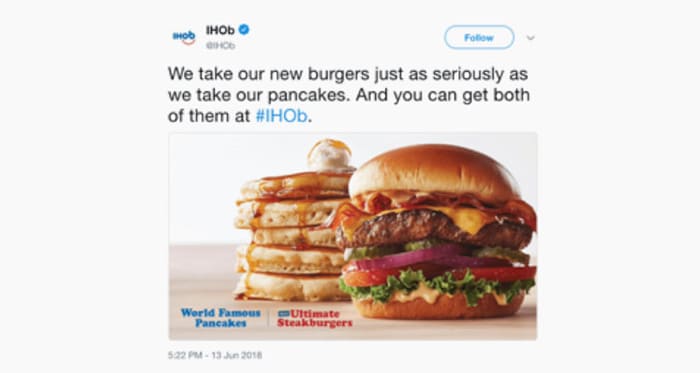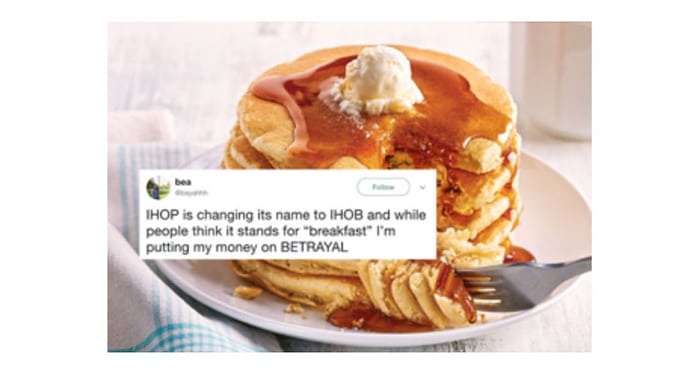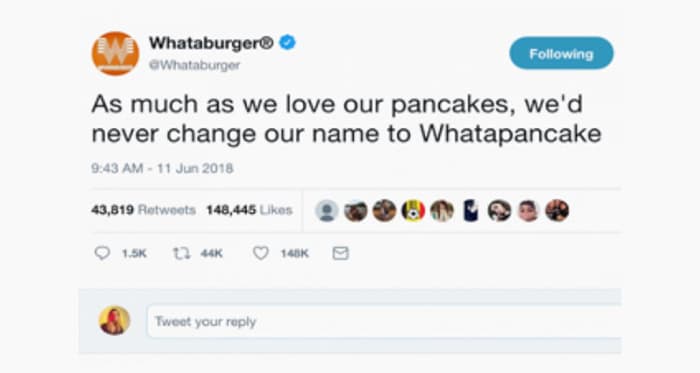Recently, IHOP (International House of Pancakes), launched an advertising campaign for their menu item, hamburgers. The 60-year-old company has never strayed from its tried and true brand of breakfast. Sure, the company has other non-breakfast menu items, but breakfast has always stayed in 1st place. Founded in 1958, the company has since opened more than 1,650 locations nationwide. While some would say the company was already on a downhill slope, the response the company got from consumers nationwide was overwhelming(ly horrible). The campaign showed the “P” (Pancakes) in IHOP flipping over into a “B” for burgers. At first glance, this looks like no big deal, however, this sparked a massive uproar online.
Social media immediately blew up in shock that the well-known breakfast chain would change their name to IHOB- most feeling a sense of betrayal (pictured below) at the chain. I don’t think many people, including myself, realized at first that the IHOB campaign was just that- a campaign. The company itself had no intention of actually re-naming the entire chain “IHOB”, it was simply a way to advertise for their burgers. This widely unknown fact propelled the online outrage. Many people were feeling personally offended that the ‘International House of Pancakes’ would now be ‘International House of Burgers’. Nobody likes change, especially a ‘60-years-into-your-brand’ change. The campaign made consumers so angry that some vowed to never return. Other large chain restaurants, like Whataburger, Wendy’s, and Burger King jumped in the online banter to further taunt the chain for their poorly received campaign.
This sparks the question- was this campaign an advertising success or a failure? While the campaign did spark anger and betrayal-like feelings, it also succeeded in getting the word out about their burgers. Advertising at this point in history can be tricky. With so many people able to share opinions instantly on the internet, it is easy for companies to unintentionally hit a nerve or misrepresent something. Most of the time, brands have no evil intentions when creating an ad that goes south. The massive company, Pepsi, is a great example of this. Last year Pepsi’s ad with reality TV star and supermodel, Kendall Jenner, got so much backlash that the company took it down and issued an apology to the public, as well as Kendall Jenner for missing the mark on their ad. Kendall Jenner also issued a personal apology for participating in said commercial.
Why is advertising so controversial these days? Are people constantly waiting for companies to mess up, or are the companies looking past the potential risks of their ads? According to Quora, controversy comes in 3 types: taste/decency, religion/beliefs, and values. You would think that advertising something that does not hit one of these topics would be easy, but all three of them are hot topics and advertisers want to make use of them. Do advertisements follow trends, or do trends follow top advertising? The back and forth nature of this relationship makes it almost easy for advertisers to come up with content based on these topics. *Warning- entering dangerous advertising territory*. While some companies like IHOP are under scrutiny for offending people because of a simple name change, others, like Pepsi, are in trouble for a lot more. The advertising field has almost become a controversy-minefield. Top advertisers can feel like they are tip-toeing through, praying they don’t hurt anyone’s feelings enough to go viral.
How can companies avoid this minefield? Be conscious. Be aware. Be respectful. All this being said, someone out there will not like your ad. No ad has 100% approval from the masses. But, still be conscious of what your ad is portraying, be respectful of everyone, and don’t find humor in the misfortune of others, and you should be okay. Now…am I supposed to order pancakes or hamburgers?



